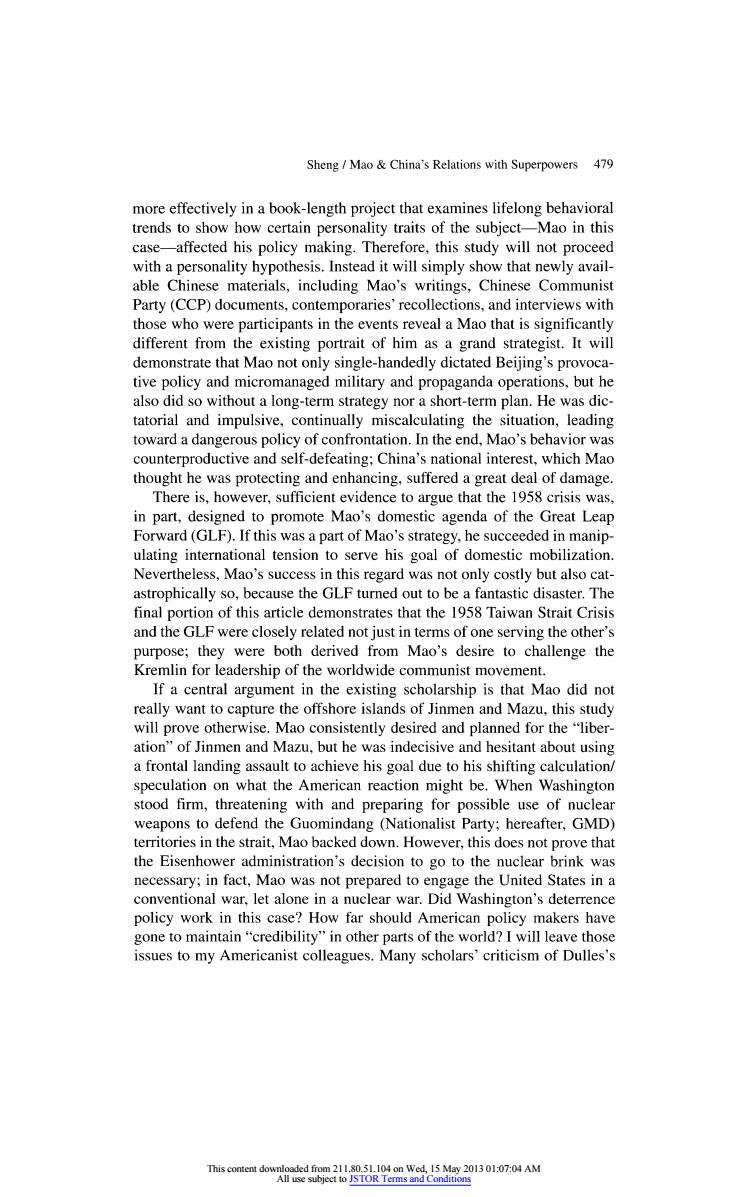正在加载图片...

Sheng/Mao China's Relations with Superpowers 479 more effectively in a book-length project that examines lifelong behavioral trends to show how certain personality traits of the subject-Mao in this case-affected his policy making.Therefore,this study will not proceed with a personality hypothesis.Instead it will simply show that newly avail- able Chinese materials,including Mao's writings,Chinese Communist Party(CCP)documents,contemporaries'recollections,and interviews with those who were participants in the events reveal a Mao that is significantly different from the existing portrait of him as a grand strategist.It will demonstrate that Mao not only single-handedly dictated Beijing's provoca- tive policy and micromanaged military and propaganda operations,but he also did so without a long-term strategy nor a short-term plan.He was dic- tatorial and impulsive,continually miscalculating the situation,leading toward a dangerous policy of confrontation.In the end,Mao's behavior was counterproductive and self-defeating;China's national interest,which Mao thought he was protecting and enhancing,suffered a great deal of damage. There is,however,sufficient evidence to argue that the 1958 crisis was, in part,designed to promote Mao's domestic agenda of the Great Leap Forward(GLF).If this was a part of Mao's strategy,he succeeded in manip- ulating international tension to serve his goal of domestic mobilization. Nevertheless,Mao's success in this regard was not only costly but also cat- astrophically so,because the GLF turned out to be a fantastic disaster.The final portion of this article demonstrates that the 1958 Taiwan Strait Crisis and the GLF were closely related not just in terms of one serving the other's purpose;they were both derived from Mao's desire to challenge the Kremlin for leadership of the worldwide communist movement. If a central argument in the existing scholarship is that Mao did not really want to capture the offshore islands of Jinmen and Mazu.this study will prove otherwise.Mao consistently desired and planned for the "liber- ation"of Jinmen and Mazu,but he was indecisive and hesitant about using a frontal landing assault to achieve his goal due to his shifting calculation/ speculation on what the American reaction might be.When Washington stood firm,threatening with and preparing for possible use of nuclear weapons to defend the Guomindang (Nationalist Party:hereafter.GMD) territories in the strait,Mao backed down.However,this does not prove that the Eisenhower administration's decision to go to the nuclear brink was necessary;in fact,Mao was not prepared to engage the United States in a conventional war,let alone in a nuclear war.Did Washington's deterrence policy work in this case?How far should American policy makers have gone to maintain"credibility"in other parts of the world?I will leave those issues to my Americanist colleagues.Many scholars'criticism of Dulles's This content downloaded from 211.80.51.104 on Wed,15 May 2013 01:07:04 AM All use subject to JSTOR Terms and ConditionsSheng / Mao & China's Relations with Superpowers 479 more effectively in a book-length project that examines lifelong behavioral trends to show how certain personality traits of the subject?Mao in this case?affected his policy making. Therefore, this study will not proceed with a personality hypothesis. Instead it will simply show that newly avail able Chinese materials, including Mao's writings, Chinese Communist Party (CCP) documents, contemporaries' recollections, and interviews with those who were participants in the events reveal a Mao that is significantly different from the existing portrait of him as a grand strategist. It will demonstrate that Mao not only single-handedly dictated Beijing's provoca tive policy and micromanaged military and propaganda operations, but he also did so without a long-term strategy nor a short-term plan. He was dic tatorial and impulsive, continually miscalculating the situation, leading toward a dangerous policy of confrontation. In the end, Mao's behavior was counterproductive and self-defeating; China's national interest, which Mao thought he was protecting and enhancing, suffered a great deal of damage. There is, however, sufficient evidence to argue that the 1958 crisis was, in part, designed to promote Mao's domestic agenda of the Great Leap Forward (GLF). If this was a part of Mao's strategy, he succeeded in manip ulating international tension to serve his goal of domestic mobilization. Nevertheless, Mao's success in this regard was not only costly but also cat astrophically so, because the GLF turned out to be a fantastic disaster. The final portion of this article demonstrates that the 1958 Taiwan Strait Crisis and the GLF were closely related not just in terms of one serving the other's purpose; they were both derived from Mao's desire to challenge the Kremlin for leadership of the worldwide communist movement. If a central argument in the existing scholarship is that Mao did not really want to capture the offshore islands of Jinmen and Mazu, this study will prove otherwise. Mao consistently desired and planned for the "liber ation" of Jinmen and Mazu, but he was indecisive and hesitant about using a frontal landing assault to achieve his goal due to his shifting calculation/ speculation on what the American reaction might be. When Washington stood firm, threatening with and preparing for possible use of nuclear weapons to defend the Guomindang (Nationalist Party; hereafter, GMD) territories in the strait, Mao backed down. However, this does not prove that the Eisenhower administration's decision to go to the nuclear brink was necessary; in fact, Mao was not prepared to engage the United States in a conventional war, let alone in a nuclear war. Did Washington's deterrence policy work in this case? How far should American policy makers have gone to maintain "credibility" in other parts of the world? I will leave those issues to my Americanist colleagues. Many scholars' criticism of Dulles's This content downloaded from 211.80.51.104 on Wed, 15 May 2013 01:07:04 AM All use subject to JSTOR Terms and Conditions